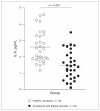Elevation of cerebrospinal fluid interleukin-1ß in bipolar disorder
- PMID: 21138659
- PMCID: PMC3044194
- DOI: 10.1503/jpn.100080
Elevation of cerebrospinal fluid interleukin-1ß in bipolar disorder
Abstract
Background: In recent years, a role for the immune system in the pathogenesis of psychiatric diseases has gained increased attention. Although bipolar disorder appears to be associated with altered serum cytokine levels, a putative immunological contribution to its pathophysiology remains to be established. Hitherto, no direct analyses of cerebrospinal fluid (CSF) cytokines in patients with bipolar disorder have been performed.
Methods: We analyzed CSF cytokine concentrations in euthymic patients with diagnosed bipolar disorder type I (n = 15) or type II (n = 15) and healthy volunteers (n = 30) using an immunoassay-based protein array multiplex system.
Results: The mean interleukin (IL)-1ß level (4.2 pg/mL, standard error of the mean [SEM] 0.5) was higher and the IL-6 level (1.5 pg/mL, SEM 0.2) was lower in euthymic bipolar patients than in healthy volunteers (0.8 pg/mL, SEM 0.04, and 2.6 pg/mL, SEM 0.2, respectively). Patients with 1 or more manic/hypomanic episodes during the last year showed significantly higher levels of IL-1ß (6.2 pg/mL, SEM 0.8; n = 9) than patients without a recent manic/hypomanic episode (3.1 pg/mL, SEM 1.0; n = 10).
Limitations: All patients were in an euthymic state at the time of sampling. Owing to the large variety of drugs prescribed to patients in the present study, influence of medication on the cytokine profile cannot be ruled out.
Conclusion: Our findings show an altered brain cytokine profile associated with the manifestation of recent manic/hypomanic episodes in patients with bipolar disorder. Although the causality remains to be established, these findings may suggest a pathophysiological role for IL-1ß in bipolar disorder.
Figures


References
-
- Berk M, Dodd S, Kauer-Sant’anna M, et al. Dopamine dysregulation syndrome: implications for a dopamine hypothesis of bipolar disorder. Acta Psychiatr Scand Suppl. 2007;(434):41–9. - PubMed
Publication types
MeSH terms
Substances
LinkOut - more resources
Full Text Sources
Other Literature Sources
Medical
